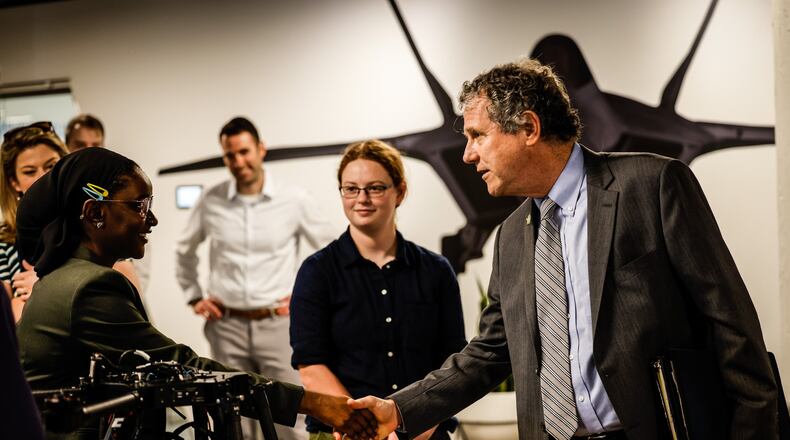Green has made some of his glowing material in Dayton, and he said he is creating a new company, Velontra, to enter the aerospace arena, establishing a test facility at a nearby airport to enable work in hypersonic technology with the Air Force Force Research Laboratory at Wright-Patterson Air Force Base. (A spokeswoman for the company said the facility, which is new, is near Middletown.)
“Because of our rich history in aerospace and the amount of aerospace engineers we have in that Dayton corridor, we’ve decided to establish our new business there ,” Green said.
Both men praised the Federal Trade Commission’s new rule that will crack down on marketers who falsely claim products are “Made in the USA.”
“Ohioans want that made-in-America in label,” Brown said.
The senator couldn’t specifically cite complaints about phone “made-in-America” labels from Dayton companies, but he was certain the practice does hurt area businesses.
Steve Staub, president and chief executive of Staub Manufacturing Solutions in Harrison Twp. and a member of the executive committee of the National Manufacturers Association, welcomes the rule and the recent attention to the issue.
“Anything that helps level the playing field with the cheating that goes on by China in manufacturing is a win,” Staub said. “You’ve got products coming in here that say they’re ‘made in America’ or even assembled (here), but they’re really not. It’s just fraud.”
When buying equipment or parts, it can be difficult sometimes to determine where they’re made. “We have large electrical projects that we’re working on,” he said. “The customer is requiring everything to be American-made. And it’s hard to figure out sometimes where things are made.”
The FTC finalized the rule earlier this month. Under the rule, marketers making unqualified “made in USA” claims on labels should be able to prove that products are “all or virtually all” made in the United States.
The rule codifies a range of penalties by the FTC, including the ability to seek redress, damages and other relief from those who lie about a product’s American origin. It will enable the commission for the first time to seek civil penalties of up to $43,280 per violation.
The rule will prohibit marketers from including unqualified Made in USA claims on labels unless final assembly or processing of the product occurs in the United States, all significant processing that goes into the product happens in the United States; and all or virtually all ingredients or components of the product are made and sourced in the United States.
Products made in China often boast “made in America” labels or are somehow adorned with U.S. flags, Brown said. “We know fraud is all too common.”
“The final rule provides substantial benefits to the public by protecting businesses from losing sales to dishonest competitors and protecting purchasers seeking to purchase American-made goods,” FTC Commissioner Rohit Chopra said earlier this month. “More broadly, this long-overdue rule is an important reminder that the commission must do more to use the authorities explicitly authorized by Congress to protect market participants from fraud and abuse.”
About the Author

